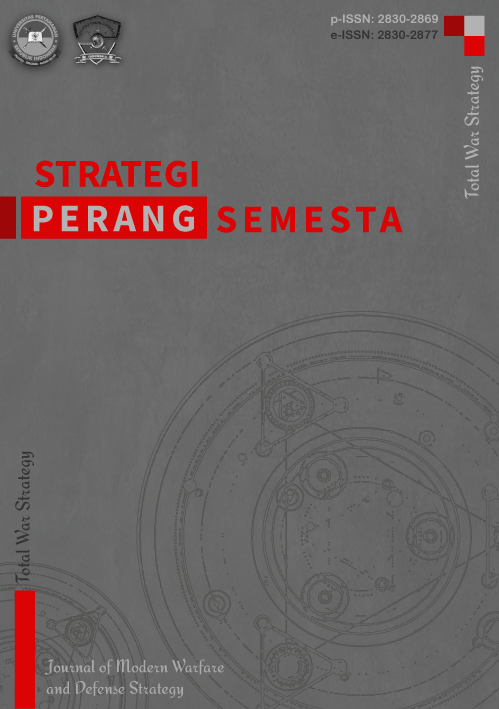Increasing the values of the state defense among youth in fighting the threat of radicalism
DOI:
https://doi.org/10.56555/sps.v8i2.1524Abstract
State defense awareness is the right and obligation of every citizen. Observing Article 27 Paragraph (3) and Article 30 Paragraph (1), it implies that efforts to defend the state in defending state are the rights and obligations of every citizen without exception. In terms of defending the country, youth need to improve their understanding of the values of defending the country so that they can ward off the threat of radicalism that continues to occur. Youth in the future will experience various threats, such as the threat of radicalism to terrorism. So, to overcome the existing threat, increasing the values of defending the country for youth is the right step in maintaining youth nationalism and patriotism as a form of love for the homeland. Improvement can be implemented through the method of defending the country and the design of materials that are relevant to the psychological characteristics of young people. Overcoming youth dislocation and social deprivation through social inclusion programs. And planting religious insight (religiosity) that is integrated with national insight.
References
Aloysius Bram Widyanto. (2010). Pemuda dalam perubahan sosial. Universitas Sanata Dharma
Andre Perdian Perdana, & Muslih. (2020). Penerapan program bela negara dalam peningkatan sikap nasionalisme di Universitas Mahalayati. Universitas Malahayati.
Arizal, O. B., Rahmat, H. K., Said, A., Basri, H., Dadang, D., Rajab, A., & Nurjannah, N. (2021). Urgensi Literasi Digital dalam Menangkal Radikalisme pada Generasi Millenial di Era Revolusi Industri 4.0. Dinamika Sosial Budaya, 23(1), 126–133. https://doi.org/10.26623/jdsb.v23i1.1698
Fica Adi Nugraha, O., & Wayan Midhio, I. (2019). Peran komite nasional pemuda Indonesia dalam menanmkan nilai-nilai bela negara di Provinsi DKI Jakarta. In Manajemen Pertahanan (Vol. 5, Issue 1). http://poskotanews.com/2017/06/20/knpi-
I Nengah Suriata. (2019). Aktualisasi Kesadaran Bela Negara Bagi Generasi Muda Dalam Meningkatkan Ketahanan Nasional. 4(1), 47–56.
Mas, R., Indrawan, J., & Efriza, D. (2021). Bela negara sebagai metode pencegahan ancaman radikalisme di Indonesia. Jurnal Pertahanan & Bela Negara, Desember 2017, Volume 7 Nomor 3
Nuriyanto, E. (2020). Peningkatan Hasil Belajar Siswa Melalui Model Pembelajaran Kooperatif Tipe Two Stay Two Stray (TSTS) Pada Siswa SMP. Jurnal Suluh Edukasi Volume 01 No 01 Maret
Sari Kusuma, R., Azizah, N., & Yani Tromol Pos, J. A. (2018). Melawan Radikalisme melalui Website. Jurnal ASPIKOM, Volume 3 Nomor 5, Juli 2018, hlm 942-957
Schmid, A. P. (2011). The Routledge Handbook of Terorism Research. New York. Routledge
Subagyo, A. (2015). Sinergi Dalam Menghadapi Ancaman Cyber Warfare Synergy In Facing Of Cyber Warfare Threat (Vol. 5).
Waluyo, S. D., Gustarina, F., Timur, C., & Susilawati, N. (2021). Pengajaran nilai bela negara melalui pendidikan kewarganegaraan sebagai upaya cegah dini terhadap radikalisme. Kajian Teori Dan Praktik Pendidikan PKN, 08(01), 10–20.
Downloads
Published
Issue
Section
License
Proposed Policy for Journals That Offer Open Access. Authors who publish with this journal agree to the following terms:
- Authors retain copyright and grant the journal right of first publication with the work simultaneously licensed under a Creative Commons Attribution License that allows others to share the work with an acknowledgment of the work's authorship and initial publication in this journal.
- Authors are able to enter into separate, additional contractual arrangements for the non-exclusive distribution of the journal's published version of the work (e.g., post it to an institutional repository or publish it in a book), with an acknowledgment of its initial publication in this journal.
- Authors are permitted and encouraged to post their work online (e.g., in institutional repositories or on their website) prior to and during the submission process, as it can lead to productive exchanges, as well as earlier and greater citation of published work (See The Effect of Open Access).
Proposed Policy for Journals That Offer Delayed Open Access. Authors who publish with this journal agree to the following terms:
- Authors retain copyright and grant the journal right of first publication, with the work [SPECIFY PERIOD OF TIME] after publication simultaneously licensed under a Creative Commons Attribution License that allows others to share the work with an acknowledgment of the work's authorship and initial publication in this journal.
- Authors are able to enter into separate, additional contractual arrangements for the non-exclusive distribution of the journal's published version of the work (e.g., post it to an institutional repository or publish it in a book), with an acknowledgment of its initial publication in this journal.

